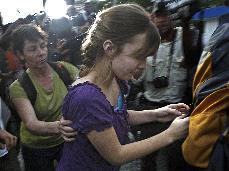By: Joel Rubin/Los Angeles Times/MCT
Posted In: News

Photo credit: Carl Juste/Miami Herald/MCT
Lead by Haitian police, eight Americans were released from jail in Port-au-Prince, Haiti, after being declared innocent of any wrongdoing in a kidnapping case. The remaining two U.S. missionaries will be detained for clarification on the group’s activitie
PORT-AU-PRINCE, Haiti – Eight of the 10 Americans jailed by Haitian authorities in late January on suspicion of kidnapping 33 children and trying to take them out of the earthquake-ravaged country were set free by a judge Wednesday.
“The judge has taken his decision and he has ordered the release of eight,” said Aviol Fleurant, who identified himself as an attorney for the group. “The world must know that all 10 are innocent!” Fleurant said the investigating judge, Bernard Saint- Vil, decided to keep Laura Silsby, the leader of the group, and Charisa Coulter for further questioning about their reported efforts to establish an orphanage for Haitian children. The lawyer said he expected the judge to release the pair “in a few days.” The eight who were freed, all looking generally healthy, were escorted from jail to a van by three U.S. Embassy officials. The van soon pulled into a secured area on the grounds of the city’s airport, where a field hospital run by the University of Miami is located. The release followed the judge’s decision that there was not enough incriminating evidence to justify putting the eight on trial, marking a reversal of fortune for the group. The same judge two weeks ago charged all 10 Americans with child kidnapping and criminal association, raising the prospect of a trial and long prison sentences. The suspects were arrested Jan. 29 when authorities stopped a bus carrying the children, five men and five women as they tried to cross into the Dominican Republic from Haiti. Their arrests came amid the chaos and emergency response to the magnitude 7.0 earthquake Jan. 12 that killed an estimated 200,000 people in the Caribbean island nation and caused widespread homelessness and destruction. At the time, group members said the children, from 2 to 12 years old, were orphans and that the group intended to provide them with shelter and care. However, the group could not provide documents proving legal custody of the children, many of whom later were found not to be orphans. The case became instant fodder for the hordes of journalists who had descended on the nation. The Americans, their intentions unclear, were portrayed alternately as would-be child traffickers looking to profit from the children or religious do-gooders lacking in common sense. Silsby persuaded her church, Central Valley Baptist Church in Meridian, Idaho, to help raise funds for the trip and send some of its members as missionaries. She secured a motel in the Dominican Republic, where she allegedly planned to house the Haitian children temporarily while permanent housing was built. Congregants at the church have strongly disputed the claims by some Haitians that the group was acting maliciously, and have been lobbying U.S. officials to work more aggressively to win the group’s release.U.S. Secretary of State Hillary Rodham Clinton said that the Americans’ fate rested with the Haitian justice system. Paul Denis, Haitian minister of justice, echoed Clinton on Feb. 11, saying the foreigners “would be judged like everyone else.” The case turned a harsh light on the staggering poverty and desperation that have long existed in Haiti and become even more severe since the earthquake. In interviews with reporters, several of the parents of the children from the heavily damaged village of Calebasse have said that they willfully handed the youngsters over to the Americans after being told they would be educated and well cared for, basics the parents said they could not provide. The children are now at a child-care center in Port-au-Prince, Haiti.
— (Los Angeles Times staff writer Nicholas Riccardi in Denver contributed to this report.)
— (c) 2010, Los Angeles Times. Visit the Los Angeles Times on the Internet at http://www.latimes.com/ Distributed by McClatchy-Tribune Information Services.












